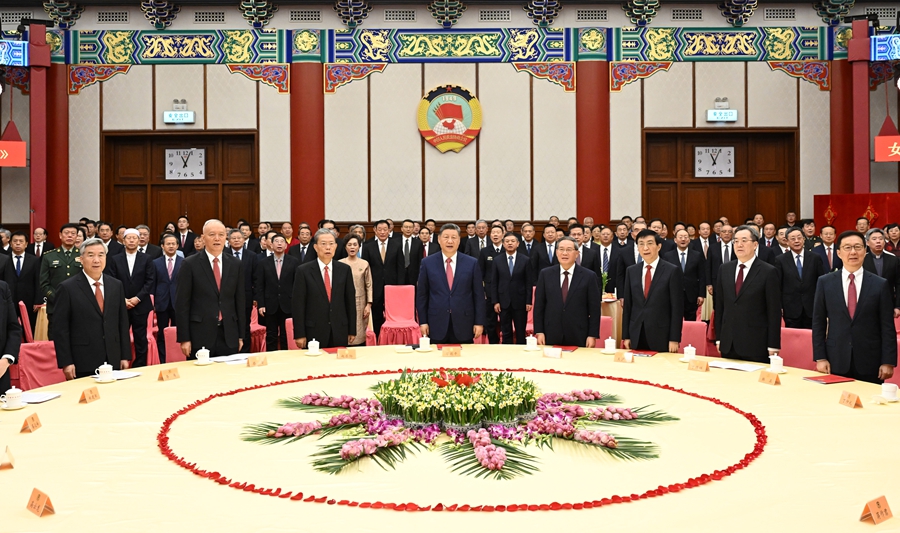
Putin’s Latest Reshuffling
Putin’s Latest Reshuffling
As is typical for Russia, long expected news is being presented to the public as something sensational and surprising. Vladimir Putin, having sworn that no one would be able to convince him to remain in power, has finally declared that he will in fact remain in power. At a convention of the “Edinaia Rossia” party, he agreed to stay in power, citing the “requests of the workers and for the benefit of the country.” Putin’s justification is exactly what the General Secretaries of the Communist Party had done in the past, since they had to be pleaded with in the name of the people in order to remain in power. While everyone had expected Putin to find a way to remain in power even after stepping down, no one knew exactly how he would do so. The current approach suggests that the constitution will eventually be changed in order to give more power to the Prime Minister, leaving the President as merely a titular head of the country and unable to effectively compete with Vladimir Putin in his newly chosen post.
At the same time, Putin continues to strengthen his position by appointing former intelligence officers to high political posts. The new Executive Secretary of the CIS, for example, is the former Foreign Intelligence Service (SVR) director Sergei Lebedev (RIA Novosti, October 6). The director’s post has been given to former Prime Minister Fradkov, an appointment that says much about the apparent lack of qualified candidates for high posts and also the rewards that may be earned by those who have demonstrated their loyalty to the head of the Russian state (www.gazeta.ru, October 6). Dmitry Kozak has been quickly replaced after leaving his old post for the position of vice-Prime Minister in the new Cabinet of Ministers (www.svoboda.org, September 24), with Georgi Rapota, a lieutenant general with 32 years in the intelligence services, taking over in the Southern Federal District (www.kavkaz.memo.ru, October 6).
Even though Kozak did not receive a significant promotion as a result of the transfer, it has allowed him to leave a region in which he had failed to implement any significant changes. During his tenure, the North Caucasus had become more unstable and explosive, with Dagestan, Ingushetia and Kabardino-Balkaria moving closer to war. Karachaevo-Cherkessia remains unsettled, with the “president versus the opposition” conflict remaining unresolved. The issue of Ingush refugees has not been addressed in North Ossetia, with local authorities afraid of mentioning the possibility of allowing the Ingush that had left their homes and apartments during the 1991 conflict to return. Chechnya, long considered a pacified territory by Putin, has been controlled by the policies of Ramzan Kadyrov and has not been affected by the Kozak administration. This is especially true because Dmitry Kozak was always hostile to the Kadyrov clan, both the father and the son, and his attempts to somehow rein in the young Ramzan were always curtailed by Vladislav Surkov, Kadyrov’s patron in the Kremlin. Kozak’s new post is undoubtedly inferior to his old one, but it is far calmer. Moreover, with his post permanently located in Moscow, Dmitry Kozak will be able to effectively maneuver between the high-ranking officials of the Russian government.
It is probable that the new Cabinet remains a transitional one and was deliberately created without any new, sensational figures. The way in which it was formed does much to bolster the idea that it is intended solely to be a temporary, transitional entity. A special note should be made of the fact that the new government includes two pairs of relatives, a phenomenon completely atypical of Russian politics. The first pair is Prime Minister Viktor Zubkov and his son-in-law Anataly Serdukov. The other is Viktor Khristenko, head of the Energy Ministry, and his wife Tatiana Golikova, who was recently appointed to the post of Minister of Health and Social Development (ITAR-TASS, September 25).
The changes in Moscow have automatically led to changes in the regions. In Chechnya, the list of candidates submitted by the “Edinaia Rossia” party was a true sensation, since it failed to include parliamentary speaker Dukuvakh Abdurakhmanov, long considered the most loyal follower of Ramzan Kadyrov among the local politicians. Adam Demilhanov, on the other hand, a member of the security services and a man who is hardly a “second ranker” within the republic, made the list. Another individual included on the list was Magomed Vakhaev, the head of the republic’s Constitutional court, a completely unimportant post in the current scheme of Russian governance. Ziad Salsabi, a former Iraqi communist of Chechen extraction and the current head of the Chechen mission in Moscow, is yet another new face on the party list (www.skavkaz.rfn.ru, October 3).
In Ingushetia, the list of “Edinaia Rossia” candidates omitted the very president of the Republic, with Belan Khamchiev, the head of the Department of Plants, Fertilizers and Crop Protection from the Ingush ministry of agriculture heading up the nominees (www.regnum.ru, October 3). This is undoubtedly a black mark for Murat Zyazikov, the current president.
In Dagestan the most surprising news was the absences of Avar leader Khadzhi Makhachev and businessman Suleiman Kerimov (head of “GNK Nafta-Moskva”), one of the richest men of the republic, from the list. This may indicate that the Kremlin had applied pressure in order to remove Makhachev, a man with a criminal past, as well as Kerimov, a potential competitor in the oil industry.
The president of Karachaevo-Cherkessia, Mustafa Batdyev, managed to squeeze two of his classmates and close friends onto the party lists (www.regnum.ru, October 3). Kozak’s exit from the region is a blow to Batdyev’s authority, and his unwillingness to accept any candidates from Moscow may lead to a quarrel with his former boss, Anatoly Chubais, thus weakening his position further.
Simultaneous with these ongoing changes in the corridors of power is an additional point of contention that has arisen in the North Caucasus. The decision to hold the 2014 Olympic Games in Sochi has been a severe blow to the millions of Circassians around the world, since they see this event as legitimizing their expulsion from the region. The last Ubykh and Shapsug remaining near Sochi will be forced out during the construction of infrastructure for the Games. This may come as a boon to the resistance movement in the North Caucasus as they use this opportunity to strike against Russian interests in the region.
Given all of these factors, it is possible to predict that in the short run, the current distribution of political forces will do nothing to stabilize the region and may even worsen the situation in Ingushetia and Karachaevo-Cherkessia.


